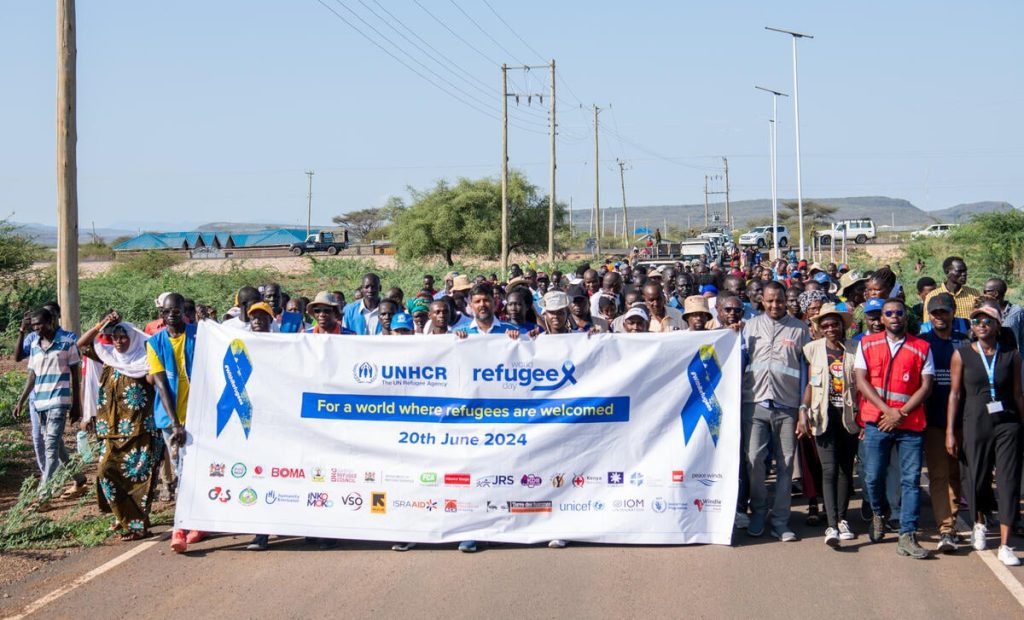Uganda Commemorates World Refugee Day

Uganda commemorates World Refugee Day amidst a dire situation with ongoing wars and conflicts. The country faces a significant influx of refugees, with an average of 414 individuals seeking asylum daily. Between January and March 2024, 37,300 refugees arrived in Uganda, straining its resources. Globally, over 114 million people are displaced due to war, violence, and climate challenges. Uganda’s refugee population has reached 1.68 million, primarily from South Sudan, the DRC, Sudan, Eritrea, and Somalia.

Some of the People who celebrated World Refugee Day in Uganda
Yesterday 20th June 2024, Uganda joined the rest of the world to commemorate World Refugee Day as the national and global situation becomes dire, with ongoing wars and new conflicts emerging.
Uganda is grappling with a staggering influx of refugees, with a daily average of 414 individuals seeking safety and asylum within the country.
Reports indicate that between January and March 2024, a staggering 37,300 refugees arrived in Uganda, excluding newborns. This translates to a monthly intake of 12,433 refugees, putting a significant strain on the country’s resources.

Some of the Refugees in Uganda
Over 114 million people globally, including 24.5 million from the East, Horn, and Great Lakes Regions, have been forcibly displaced due to war, violence, and climate-related challenges.
In Uganda, the refugee population has reached 1,680,000, and, according to the United Nations High Commission for Refugees (UNHCR), the situation continues to grow due to ongoing persecution, conflicts, and communal violence.
Most refugees in Uganda are from South Sudan, the Democratic Republic of the Congo, Sudan, Eritrea, Somalia, and over 15 other countries.
“More than 300,000 people have crossed into Uganda seeking safety since 2022, including 35,000 arriving from Sudan. The pressure on public services, including health, education, water, and sanitation, is mounting because of the ongoing and steady influx of refugees into Uganda. Humanitarian organizations are overstretched, facing increased demands while dealing with limited funding,” said UNHCR.
Uganda has an open-door refugee policy. The government’s approach to refugee management allows refugees to live, work, and access public services like national citizens.
The Minister for Relief, Disaster Preparedness, and Refugees, Hilary Onek, said that this represents true solidarity with refugees, adding that offering shelter and protection to refugees is an expression of our shared humanity.
“Uganda has made a strong statement that, beyond feeling safe and welcomed, refugees need opportunities to thrive. They need a chance to learn and progress, to earn a living, and to feel a sense of belonging,” he said.
“Countries with more means should host refugees without being restrictive. This would embody the true spirit of a world that welcomes refugees.”
Onek said that Uganda, along with other countries hosting refugees, requires the solidarity of the international community in alignment with the Global Compact on Refugees, adding that it is not possible for Uganda, as the largest hosting country in Africa, to cope without additional support and resources.
The UNHCR Country Representative in Uganda, Matthew Crentsil, said the world has a collective obligation to support refugees in their country of asylum by facilitating access to quality education, healthcare, and social services.
“We must encourage their active participation in developmental activities in their local communities and promote self-reliance by strengthening the job market in refugee-hosting districts. These actions demonstrate solidarity with refugees and create conditions for them to support themselves and their communities while in exile,” he said.
In 2024, UNHCR and partners have appealed for $858 million, but only 13% of the required funds have been received, leaving 1.68 million forcibly displaced persons, predominantly women and children, and 2.7 million host community members at risk of becoming increasingly vulnerable as access to services and food assistance is reduced.
The UNICEF Representative in Uganda, Munir Safieldin, called for a significant increase in international responsibility-sharing to ensure refugee children have sustainable access to basic services including education, health, nutrition, protection, water, and sanitation.
“This requires long-term commitment among all parties to support the integration of refugees in the national service delivery systems, as well as a well-resourced strategy to promote the resilience and self-reliance of the refugee population, particularly the adolescent, youth, and women,” said Safieldin.
He called on the world to take action, saying that no one willingly abandons their homes and lives.
Seeking refuge is not a choice; it becomes the only option for survival, to find peace, and a way to preserve dreams.







